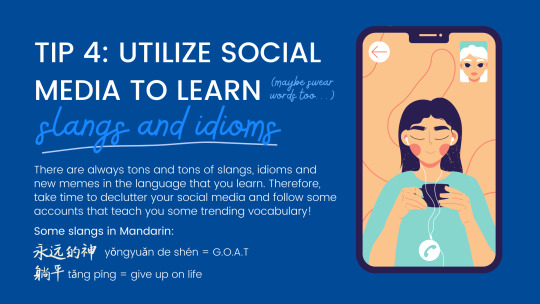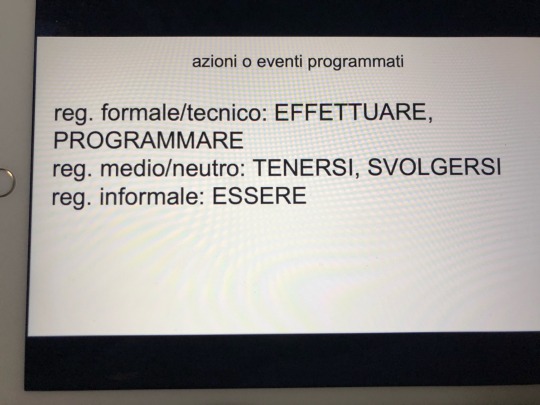Text
Italian vocab I learned today
Albume – egg whites
Il tuorlo – egg yolk
La teglia – oven dish
Albumi montani a neve — whipped egg whites
Il colino – the strainer
Lo strato – the layer
Fornella – cooker
Grattugiare – to grate
Scaldare — to warm up
22 notes
·
View notes
Text
Italian notes: the prices of cold cuts, cheese, fruit, vegetables and bread are always “al chilo”
0 notes
Text
Most common O=>UE verbs
These aren’t all of them, obviously, but they’re the most common and the most useful O=>UE verbs that I know of. There are also other O=>UE verbs that are less common [such as rodar “to roll” or soldar “to weld”] that are situationally very useful, so just keep an eye out for these types of verbs
poder = to be able to / “can”
dormir = to sleep
morir(se) = to die / to pass away
soler = to do frequently, to be in the habit of
[a verb with a very irregular use, so be careful!]
encontrar = to find
llover = to rain
volar = to fly [sometimes “to blow up”]
volver = to return
volver a (hacer algo) = to (do something) again
devolver = to return (an item), to give back (an item)
envolver = to envelope, to cover, to wrap up
absolver = to absolve
resolver = to solve, resolve
doler = to cause pain
[used with indirect objects as “to hurt” or “to be hurt by”]
soñar (con algo/alguien) = to dream (of something/someone)
oler = to smell
[note: oler turns to huelo, huele, hueles, huele, hulen, olemos because the O that turns to UE is the first letter]
oler a algo = to smell like something
sonar = to sound / to ring [phones/electronic devices]
sonar a algo/alguien = to sound like something/someone
probar = to prove / to try / to taste, to try, sample (food)
contar = to count / to tell a story
descontar = to discount
recordar = to recall
recordar + indirect objects = to bring to mind
morder = to bite
acordarse (de algo) = to remember
acordar = to agree upon [no reflexive on this one]
soltar = to release, to let loose
volcar(se) = to overturn (often vehicles or other objects), to capsize (ships), to flip over
torcer = to twist
torcer + indirect objects = to twist or to sprain (used with body parts)
costar = to cost
costar + indirect objects = to be difficult for someone
colgar = to hang / to hang up (phones)
acostar = to put (someone) to bed / to lay someone down
acostarse = to lie down / to go to sleep
acostarse con alguien = to sleep with someone, to have sex with someone
mover(se) = to move, to make movements
moler = to grind, to crush up [in some contexts “to mill”]
poblar = to populate
promover = to promote
conmover = to affect (emotionally), to bring out (emotions)
mostrar = to show
demostrar = to demonstrate
rogar = to beg, to plead
forzar = to force
avergonzar = to shame, to humiliate, to embarrass
avergonzarse = to be ashamed, to become embarrassed
apostar = to bet, to place a bet / to gamble / to guess
Pay special attention to poder, dormir, and morir. They’re the most irregular of these stem-changing verbs, but also probably the most useful verbs in this list!
159 notes
·
View notes
Note
How do you say "to break up/we broke up"?
Assuming you mean in terms of relationships.... typically it's romper con alguien "to break up with someone"
If it's one-sided, it's someone rompió con alguien
If it's more mutual, nos rompimos "we broke up (with each other)"
But like, "they broke up" is often rompieron
Also, you could use separarse "to separate/break up"
[also, "to dump someone" is often dejar "to leave"]
87 notes
·
View notes
Text
Italian exercise
Choose the sentence that has no mistakes and check your answer under the keep reading link.
1.
A. A me mi piace ascoltare la musica.
B. Mi piace ascoltare la musica.
C. Mi piaci ascoltare la musica.
D. Mi piace di ascoltare la musica.
2.
A. Ho voglia di caffè.
B. Ho vuole caffè.
C. Ho vuole del caffè.
D. Ho voglio di caffè.
3.
A. Di dove sei?
B. Di dov'è sei?
C. Da dove sei?
D. Di dove vieni?
4.
A. Quale è lo tuo colore preferiti?
B. Quali è il tuo colori preferito?
C. Qual è il tuo colore preferito?
D. Qual'è il tuo colori preferito?
5.
A. Come ti chiami?
B. Como ti chiami?
C. Come te chiami?
D. Como te chiamo?
6.
A. Te chiedo scusa.
B. Ti chiedo scusami.
C. Ti chiedi scusa.
D. Ti chiedo scusa.
1B - 2A - 3A - 4C - 5A - 6D
33 notes
·
View notes
Text
Il passato in Italiano
In questa nuova seria, discuteremo il passato in Italiano, in tutte forme, iniziando con il passato prossimo.
In this new series, we’ll discuss the past in Italian, in all its forms, starting with the present prefect.
Questo sia probabilmente il più semplice sulla lista – construire una frase per qualcosa che ha succedato più recentamente, semplicamente prendere il coniugazione presente por “avere”, e poi conjugare il verbo principale con il participi passati. Il participio passato é “ato” per verbi are, “uto” per “ere” e “ito” per ire.
This is probably the simplest on the list – to construct a phrase for something that has happened more recently, simply take the past perfect conjugation for “to have” and then conjugate the main verb with the past participle. The past participle for “ato”
La coniugazione per avere sono:
The conjugations for to have are:
I have = ho
You have = hai
He/she/it has = ha
We have = abbiamo
They have = hanno
You guys/you all have = avete
4 notes
·
View notes
Text

Preguntar vs pedir – what’s the difference?
Preguntar vs pedir
Preguntar and pedir can both technically be translated as “to ask” – but what’s the difference between them?
While preguntar means “to ask” in terms of answering a question, “pedir” means “to order” or “to request”
When you add a “se” to make it reflexive, “preguntarse” also means “to wonder”, because when you wonder you ask yourself things!
1 note
·
View note
Text
You’ve heard of Soy Milk, now get ready for Estoy Milk
428 notes
·
View notes
Text
Update i read an article in Spanish so I’m calling that a victory
Second week of the year… and my weekly language goals have gone down like Gwen Stacey 😭
3 notes
·
View notes
Text
Second week of the year… and my weekly language goals have gone down like Gwen Stacey 😭
3 notes
·
View notes
Photo

il Natale – Christmas
la vigilia di Natale – Christmas Eve
l(a) Epifania – Epiphany
l(o) inverno – winter
l(o) abete – fir tree
l(o) addobbo – decoration
l(o) agrifoglio – holly
l(o) albero di Natale – Christmas tree
gli auguri (di Natale) – (Christmas) wishes
il biscotto – cookie
il calendario dell’Avvento – advent calendar
la calza – stocking
il camino – chimney/fireplace
la candela – candle
i canti di Natale – Christmas carols
la caramella – candy
la castagna – chestnut
il festone – (paper) festoon
la ghirlanda – wreath, garland
il giocattolo – toy
le lucine – (Christmas) lights
le luminarie – (Christmas) lights [in the streets]
la neve – snow
la pallina (di Natale) – Christmas bauble
il pandoro – sweet yeast bread, typically eaten at Christmas
il panettone – sweet bread containing candied fruit and raisins
il presepe – nativity scene
il pupazzo di neve – snowman
il regalo – present
i re Magi – Three Kings
la renna – reindeer
la slitta – sleigh
la stella cometa – Christmas star (literally, “comet [star]”)
la tombola – common family game, not unlike bingo
il vischio – mistletoe
People (?)
Babbo Natale – Santa Claus
l(o) elfo – elf
la Befana – usually portrayed as a hag riding a flying broomstick, on Epiphany Eve she is said to visit Italian homes to fill with candy the stockings of the children who made her “nice” list (and leave coal to the naughty ones)
Expressions
comprare i regali di Natale – to buy Christmas presents
fare l’albero – to decorate the Christmas tree
fare gli auguri di buon Natale (a qualcuno) – to wish (somebody) a merry Christmas
613 notes
·
View notes
Text
Fireworks night vocab in Dutch!

Fireworks – vuurwerk
Bonfire – vreugdevuur
Buskruit – gunpowder
Sparkling – fonkeling
0 notes
Text
Italian baking vocab aka what happens when I make vocab lists while watching bake off
🍰🍰🍰🍰🍰🍰🍰🍰🍰🍰🍰🍰🍰🍰
Bowl – ciotola
Whisk – frusta
Cake – torta
To bake – cuocere al forno
Dough – impasto
Sugar – zucchero
Bread – pane
Layers – strati
Dessert – dolce
Gelatin – gelatina
🍰🍰🍰🍰🍰🍰🍰🍰🍰🍰🍰🍰🍰🍰
6 notes
·
View notes
Text
Just some vocab in Spanish
I don’t honestly know how many of these random vocab lists I’ve done but here we go again!
la noria = Ferris wheel
[in Spain it’s la noria, sometimes it goes by other names in other countries often related to la rueda “wheel”; I’ve seen la rueda Ferris, la rueda de fortuna “wheel of fortune”, la rueda muscovita “wheel of Moscow” / “Muscovite wheel” and others; some countries also say la vuelta al mundo “(trip) around-the-world”]
el jabón = soap
las tijeras = scissors
la encrucijada = crossroads, junction / “a crossroads” (in the sense of a turning point or a time where you have to make an important decision)
la medusa = jellyfish
agregar = to add, to add to
la decepción = disappointment
el mazo = mallet / deck of cards, sheaf/bundle of paper
el rasgo = trait, characteristic
el avión = plane, airplane
disparar = to shoot (a gun)
crujir = to rustle (leaves) / to grind (teeth) / to crunch (food, like potato chips or something “crunchy”, or said of rocks like gravel or something scraping)
la subasta = auction (also a “bid” as in making an offer of money)
interpretar = to interpret / to play a part (in a play/movie/show, used in acting or theater or movies)
el bizcocho = cake, sponge cake [sometimes it means different things like “biscuit” or “lady finger” or “tea cake”, or sometimes it’s just a default word for “cake” or “baked good”; it generally just means a soft cake]
el señuelo = decoy, lure
la pala = shovel, spade
el papel = paper / a role
hacer el papel = to play a role, to play a part
la trompa = trunk of an elephant / long nose of an animal, proboscis / French horn
el lodo = mud / sludge
machacar = to pummel, to mash, to slam
el faro = lighthouse
el giro = a spin, a turn / a twist / a turn of phrase
el pomelo / la toronja = grapefruit
la aleta = fin (of a fish), flipper (of seals/whales etc)
teñir = to dye / to tinge
teñirse el pelo/cabello = to dye one’s hair
la cuna = cradle / “birthplace”
avivar = to intensify, to give life to / to stoke (a fire) / to goad, to incite, to spur on / “to fan the flames”, “to pour fuel on the fire”
el gesto = a gesture
el meollo = marrow / “the important part”, “the heart of the issue”
194 notes
·
View notes
Text
ways to learn foreign languages






Hi it’s werelivingarts and I’m back with some unique tips on learning foreign languages. I love learning Mandarin and Korean, and my foreign friends absolutely love it when I try to speak with them. ✨
Learning languages is tough but really fun. Remember that you need to set goals, such as by the end of today, I will finish studying the alphabet, not the simple “getting fluent” goal. It’s okay when things you first say are gibberish because you will certainly get better by learning your mistakes.
Here are just some extra weird ways to help you learn:
● Use region-specfic social media (Weibo for Chinese, Kakao Talk for Korean, etc)
● Narrate in other languages as you commute (e.g. the mysterious man who wears brown cap-toe Oxfords just get his cats turn left and is now entering the supermarket)
● Read newspaper and magazine
● Change your phone language
● Get help from your native speaker friends
● Take notes in other languages
P/s: Do you have any useful methods to learn foreign languages? If yes, please share it down here 🤩⬇️
3K notes
·
View notes
Text
Por favor, me mande algo escribir en español, porque realmente necesito practicar 😩 🙏
0 notes

